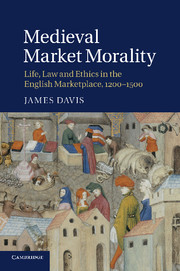Conclusion
Published online by Cambridge University Press: 05 December 2011
Summary
It has been a recurrent theme of the historiography of the Middle Ages to encapsulate the conduct of market trade within the terms ‘paternal’ and ‘moral economy’. Some historians following this approach have contended that there existed an antipathy between prevailing Christian ideology that denigrated commercial activity and the actual needs of the marketplace. Medieval market prosperity was thus subordinated to upholding the welfare of the poor, the privileges of the elite and issues of salvation. In the resulting clash between various interest groups, economic efficiency suffered and growth was inhibited. However, the reality of medieval trade and its control was far more complex. Market morals, law and practice were not necessarily incompatible and, indeed, could be mutually supportive.
Amongst the myriad of market regulations and institutions can be discerned a set of shared values that informed medieval people about the boundaries for acceptable behaviour. Anxieties were rehearsed in clerical exhortations and literature, which also acted as warnings for participants in the marketplace. A common theme of preachers was a sense of obligation to the poor and neighbours, linked to an acceptance of mutual responsibilities. Traders were recognised as important for the sustenance of society, but there was a continuing suspicion about their motives and the potential for abuses and damage to the community. Medieval literature presented an image of persistent fraud, trickery and greed. There were fears that ill-regulated petty retailers left the poor unserved, led to moral decay and caused social disorder, while the traders’ own souls would rot in hell. However, even as they clung tenaciously to conventional convictions and tropes, many late medieval writers were well aware of the complex social and economic realities of their time. They discussed the just price in terms of the market price, recognised the utility of middlemen, and chronicled the growing pervasiveness of market activity.
- Type
- Chapter
- Information
- Medieval Market MoralityLife, Law and Ethics in the English Marketplace, 1200–1500, pp. 450 - 458Publisher: Cambridge University PressPrint publication year: 2011



